Eco-friendly tea practices blend sustainability with enhanced flavor, offering you a superior drinking experience while reducing environmental impact. You can minimize waste by choosing biodegradable packaging, purchasing in bulk, and using reusable infusers. Opt for loose leaf teas to eliminate single-use bags and explore brewing methods like gongfu or cold brew to maximize flavor. Don't forget to compost your spent leaves or use them in your garden. Growing your own herbs for tea is another great way to reduce packaging waste and enjoy fresh flavors. By adopting these practices, you'll not only savor better tea but also contribute to a greener planet. The journey to sustainable sipping is just beginning.
Sustainable Tea Packaging Options
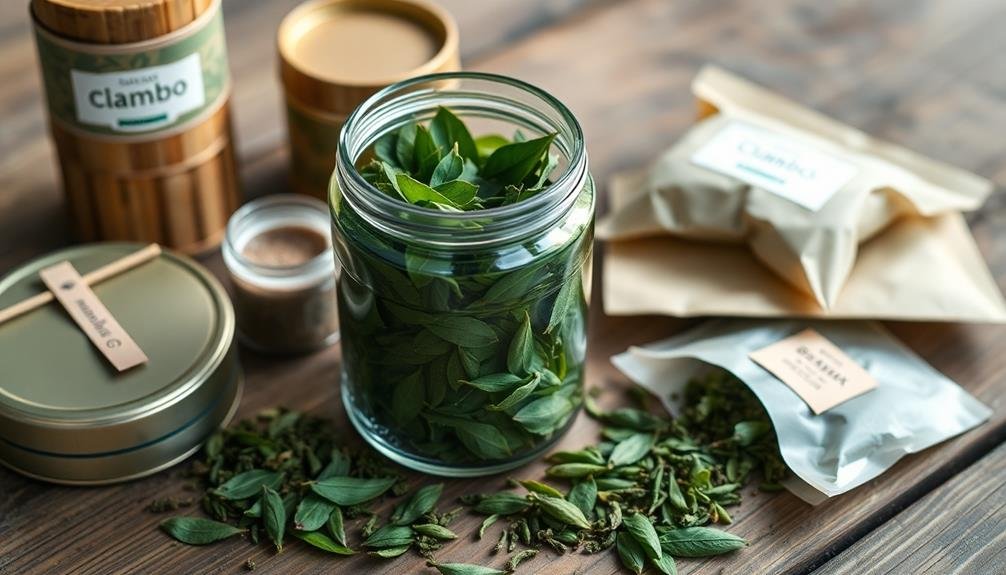
When it comes to sustainable tea packaging, you've got more options than ever before. Many tea companies are now offering biodegradable or compostable tea bags made from materials like cornstarch, plant-based plastics, or organic cotton. These options break down naturally, leaving no harmful residues in the environment.
For loose-leaf tea enthusiasts, reusable tea filters made from organic cotton, hemp, or stainless steel are excellent choices. They're durable, easy to clean, and eliminate the need for disposable tea bags altogether. Some brands also offer refillable tea tins or paper pouches, reducing packaging waste.
Another innovative solution is pyramid-shaped tea bags made from plant-based materials. These provide ample space for tea leaves to expand while being fully biodegradable. Some companies are even experimenting with water-soluble packaging that dissolves completely in your cup.
When shopping for tea, look for brands that use minimal packaging or recyclable materials. Opt for larger quantities to reduce overall packaging waste. By choosing sustainable packaging options, you're not only enjoying a great cup of tea but also contributing to a healthier planet.
Bulk Tea Purchasing Benefits
When you buy tea in bulk, you're not just saving money—you're also reducing packaging waste.
Purchasing larger quantities of loose leaf tea often results in a lower cost per serving compared to individually packaged tea bags.
Cost-Effective Tea Buying
Tea lovers' wallets can breathe a sigh of relief when they discover the benefits of buying in bulk. When you purchase larger quantities of tea, you'll often find significant savings compared to buying smaller packages. Many tea suppliers offer discounts for bulk orders, allowing you to stock up on your favorite blends at a lower cost per ounce.
By buying in bulk, you'll also reduce the frequency of your tea purchases, saving time and potentially cutting down on shipping costs if you order online. You can take advantage of sales and promotions to further maximize your savings.
Additionally, bulk buying allows you to experiment with new varieties without committing to large quantities of unfamiliar teas.
To make the most of cost-effective tea buying, consider splitting large orders with friends or family members. This approach lets you enjoy bulk pricing while still maintaining variety in your tea collection.
Remember to store your tea properly in airtight containers to preserve its freshness and flavor. By implementing these strategies, you'll not only save money but also guarantee a constant supply of high-quality tea for your daily enjoyment.
Reduced Packaging Waste
Beyond cost savings, bulk tea purchasing offers significant environmental benefits through reduced packaging waste. When you buy tea in bulk, you're eliminating the need for individual packaging, which often includes plastic wraps, foil sachets, and cardboard boxes. This reduction in packaging materials directly translates to less waste ending up in landfills or oceans.
By opting for bulk tea, you're also supporting a more sustainable supply chain. Manufacturers can transport larger quantities of tea using fewer resources, reducing the overall carbon footprint associated with packaging and shipping.
You'll find that many bulk tea suppliers use reusable or biodegradable containers, further minimizing environmental impact. When you bring your own containers to refill at bulk tea stores, you're actively participating in a zero-waste lifestyle.
This practice not only reduces packaging waste but also encourages you to be more mindful of your consumption habits. Additionally, you'll have the flexibility to purchase exactly the amount of tea you need, preventing unnecessary waste from expired or unused tea.
Reusable Tea Infusers
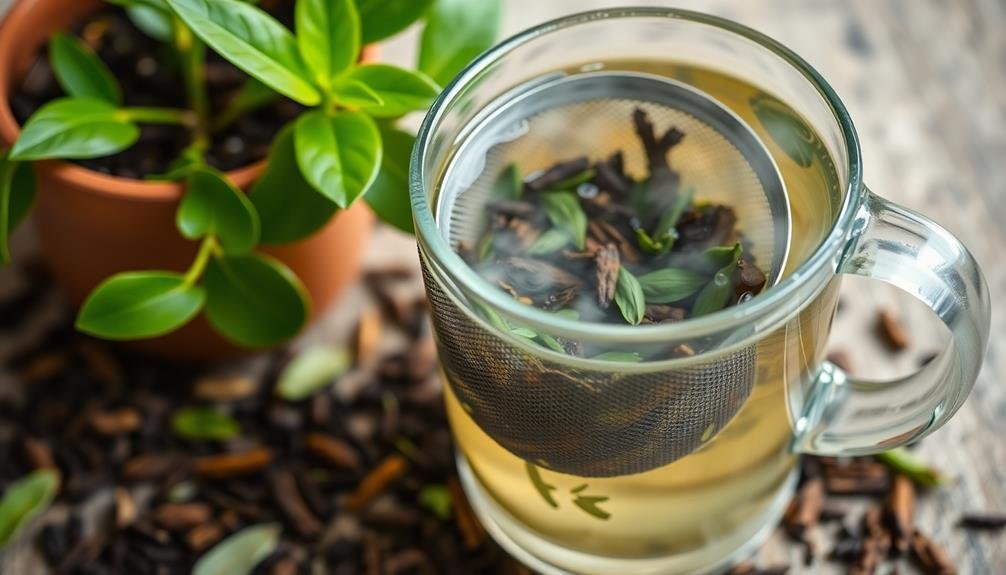
Many eco-conscious tea lovers are turning to reusable tea infusers as a sustainable alternative to disposable tea bags. These handy devices allow you to enjoy loose leaf tea without generating waste from single-use bags. You'll find a variety of options, from stainless steel mesh balls to silicone strainers and even adorable novelty shapes.
Using a reusable infuser is simple. Just fill it with your favorite loose leaf tea, place it in your cup or teapot, and pour hot water over it. After steeping, remove the infuser and enjoy your tea. Clean-up is easy too; simply empty the used leaves into your compost bin and rinse the infuser.
By switching to a reusable infuser, you're not only reducing waste but also improving your tea experience. Loose leaf teas often offer superior flavor and aroma compared to bagged varieties. Plus, you can control the strength of your brew by adjusting the amount of tea leaves you use.
Investing in a quality reusable infuser is a small change that can make a big difference in your eco-friendly tea routine. You'll save money in the long run and enjoy better-tasting tea while minimizing your environmental impact.
Composting Spent Tea Leaves
Once you've finished brewing your tea, don't toss those spent leaves in the trash. Instead, add them to your compost bin or garden.
Tea leaves are rich in nitrogen and make an excellent addition to your composting routine. They'll break down quickly, improving soil structure and providing nutrients for your plants.
You can sprinkle used tea leaves directly onto your garden soil or mix them into your compost pile. They're particularly beneficial for acid-loving plants like roses, ferns, and azaleas.
If you're using tea bags, make sure they're made of biodegradable materials and remove any staples or tags before composting.
For those without a garden, you can still put spent tea leaves to good use. Use them as a natural odor absorber in your refrigerator or sprinkle them on your carpets before vacuuming to freshen up your home.
You can even add them to your houseplants' soil for a nutrient boost.
Growing Your Own Herbs
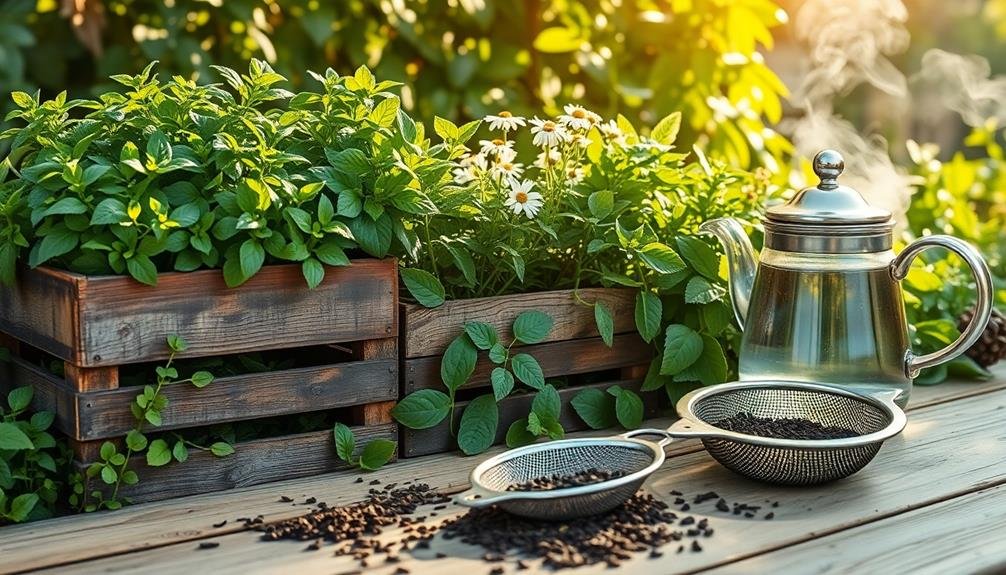
If you're looking to make your tea experience even more eco-friendly, growing your own herbs is an excellent step. You'll reduce packaging waste, eliminate transportation emissions, and enjoy the freshest possible ingredients.
Start by choosing herbs that thrive in your climate and available space. Popular tea herbs include mint, chamomile, lemon balm, and lavender.
For indoor growing, select a sunny windowsill or invest in a small grow light. Use organic potting soil and containers with drainage holes.
Outdoor herb gardens can be planted in raised beds or directly in the ground. Ascertain your herbs receive adequate sunlight and water. Most herbs prefer well-draining soil and moderate watering.
Harvest your herbs regularly to encourage growth. For tea, pick leaves in the morning after the dew has dried but before the sun gets too hot.
You can use fresh herbs immediately or dry them for later use. To dry, hang small bunches upside down in a warm, dark place with good air circulation.
Once dried, store in airtight containers away from light and heat.
Zero-Waste Tea Brewing Methods
You can considerably reduce waste in your tea brewing process by adopting zero-waste methods.
Invest in reusable infusers or strainers made from stainless steel or organic cotton to replace disposable tea bags.
Switching to loose leaf tea not only eliminates packaging waste but often provides a fresher, more flavorful brew.
Reusable Infusers and Strainers
While traditional tea bags contribute to unnecessary waste, reusable infusers and strainers offer an eco-friendly alternative for brewing your favorite loose-leaf teas.
These durable tools come in various materials, including stainless steel, silicone, and bamboo, guaranteeing longevity and minimal environmental impact. You'll find options like mesh balls, spoons, and baskets that cater to different cup sizes and tea types.
To use a reusable infuser, simply fill it with your desired amount of loose-leaf tea and steep in hot water. The fine mesh allows water to circulate freely, extracting the tea's full flavor while keeping leaves contained.
After brewing, empty the used leaves into your compost bin and rinse the infuser for future use.
Strainers work similarly but are placed over your cup as you pour the brewed tea, catching the leaves. They're ideal for larger teapots or when brewing directly in the cup.
Loose Leaf Tea Practices
Three zero-waste tea brewing methods stand out for their eco-friendly approach and ability to enhance the tea-drinking experience. The first is the traditional gongfu method, which uses a small teapot or gaiwan to brew multiple short infusions. This technique allows you to fully appreciate the tea's evolving flavors and aromas while minimizing waste.
The second method is the grandpa style, where you simply add loose leaves to a mug and top with hot water. As you drink, you'll refill with water, creating a continuously evolving brew. This casual approach is perfect for everyday drinking and reduces the need for additional equipment.
Lastly, there's the cold brew method, where you steep tea leaves in cold water for several hours or overnight. This gentle extraction process results in a smooth, less bitter tea that's perfect for summer refreshment.
| Method | Equipment | Steeping Time | Water Temp | Leaf-to-Water Ratio |
|---|---|---|---|---|
| Gongfu | Gaiwan or small teapot | 10-30 seconds | 190-212°F | 1:15 |
| Grandpa | Mug | Continuous | 175-212°F | 1:50 |
| Cold Brew | Large jar or pitcher | 8-12 hours | Cold | 1:60 |
Frequently Asked Questions
How Does the Brewing Temperature Affect the Eco-Friendliness of Tea Consumption?
Brewing temperature affects your tea's eco-friendliness by impacting energy use. Lower temperatures consume less energy, reducing your carbon footprint. However, you'll need to balance this with achieving ideal flavor extraction for your chosen tea variety.
Are There Any Eco-Friendly Alternatives to Electric Kettles for Boiling Water?
You'll find several eco-friendly alternatives to electric kettles. Try a stovetop kettle, solar-powered boiler, or campfire pot. You can also use a French press or pour-over method with pre-heated water from your tap.
What's the Environmental Impact of Different Types of Tea (Black, Green, Herbal)?
You'll find that different tea types have varying environmental impacts. Black tea often requires more processing, while green tea's generally lighter. Herbal teas can be more sustainable, especially if they're locally sourced or grown without pesticides.
How Can I Ensure My Tea Is Ethically Sourced and Fair Trade?
To guarantee your tea is ethically sourced and fair trade, look for certifications like Fair Trade, Rainforest Alliance, or UTZ on packaging. Research brands' sourcing practices, choose organic options, and buy from local tea shops that prioritize sustainability and fair labor.
Are There Eco-Friendly Ways to Flavor Tea Without Using Plastic-Packaged Additives?
You can flavor your tea naturally using fresh herbs, spices, or fruit peels from your garden or local market. Try adding mint leaves, cinnamon sticks, ginger slices, or citrus zest. You'll create unique blends while avoiding plastic packaging.
In Summary
You've discovered numerous ways to enjoy eco-friendly tea while reducing waste. By choosing sustainable packaging, buying in bulk, and using reusable infusers, you're making a positive impact. Don't forget to compost your spent leaves and consider growing your own herbs. With zero-waste brewing methods, you're not only minimizing your environmental footprint but also maximizing flavor. Embrace these practices, and you'll sip your tea with a clear conscience, knowing you're doing your part for the planet.

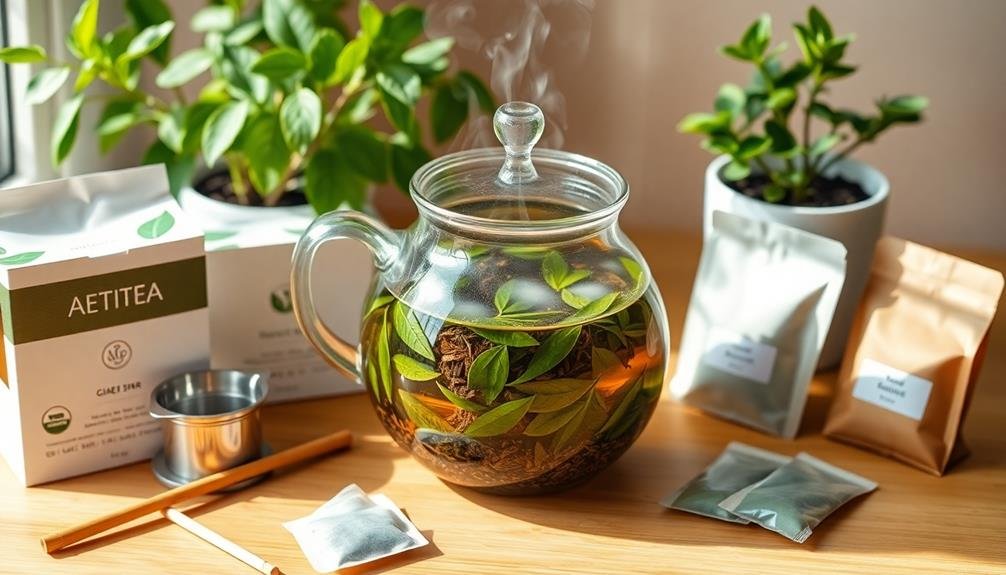
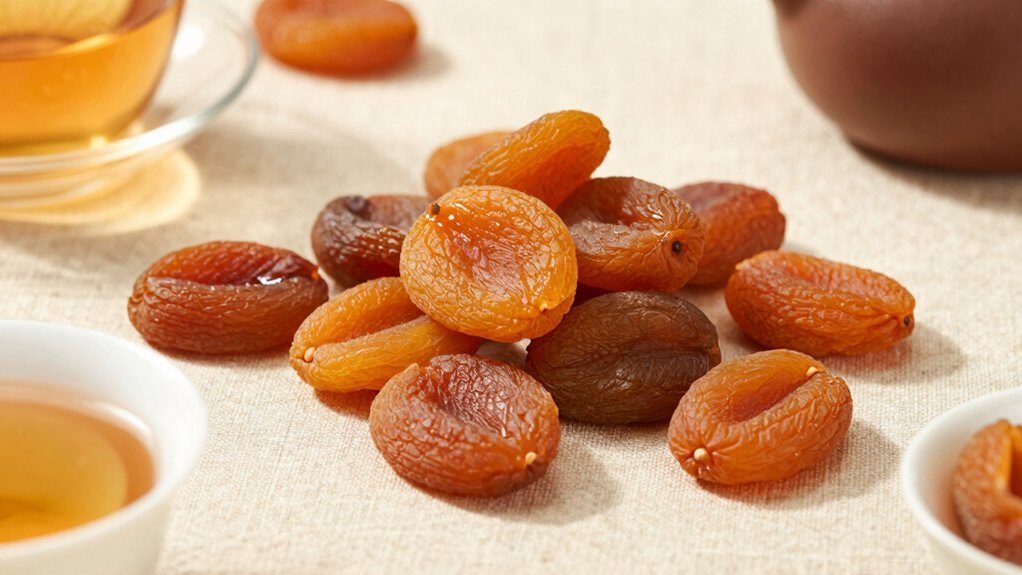
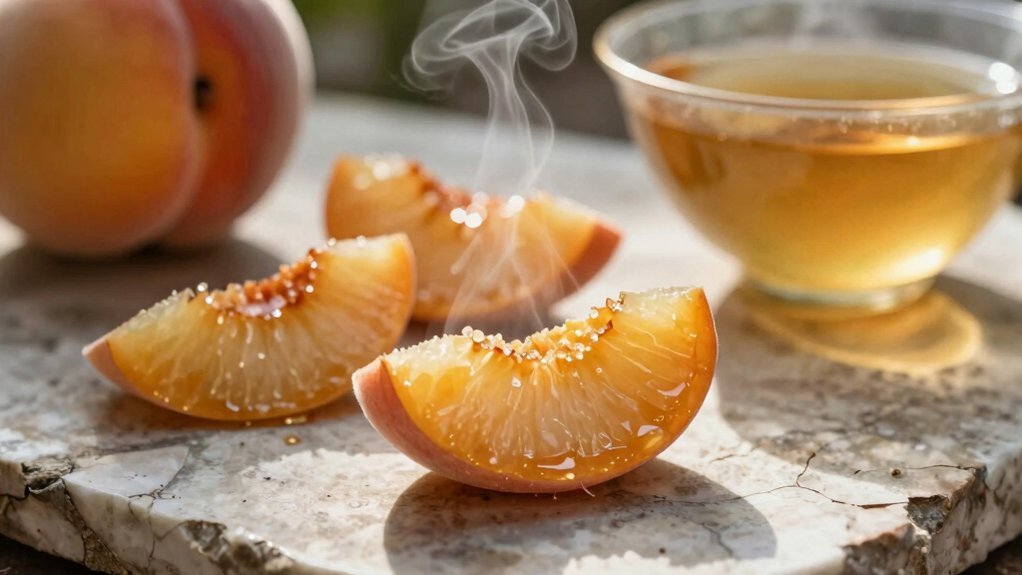
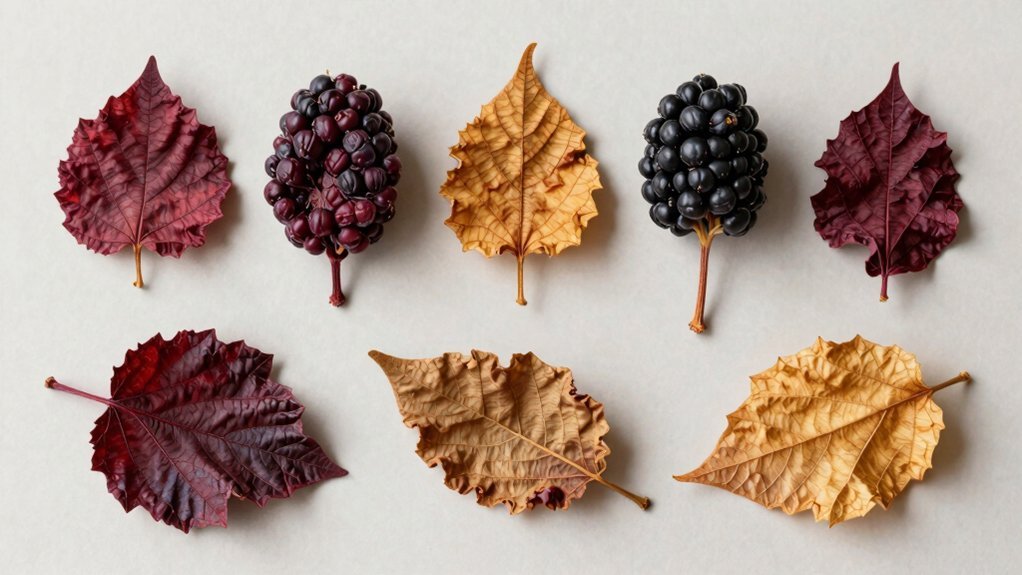
Leave a Reply